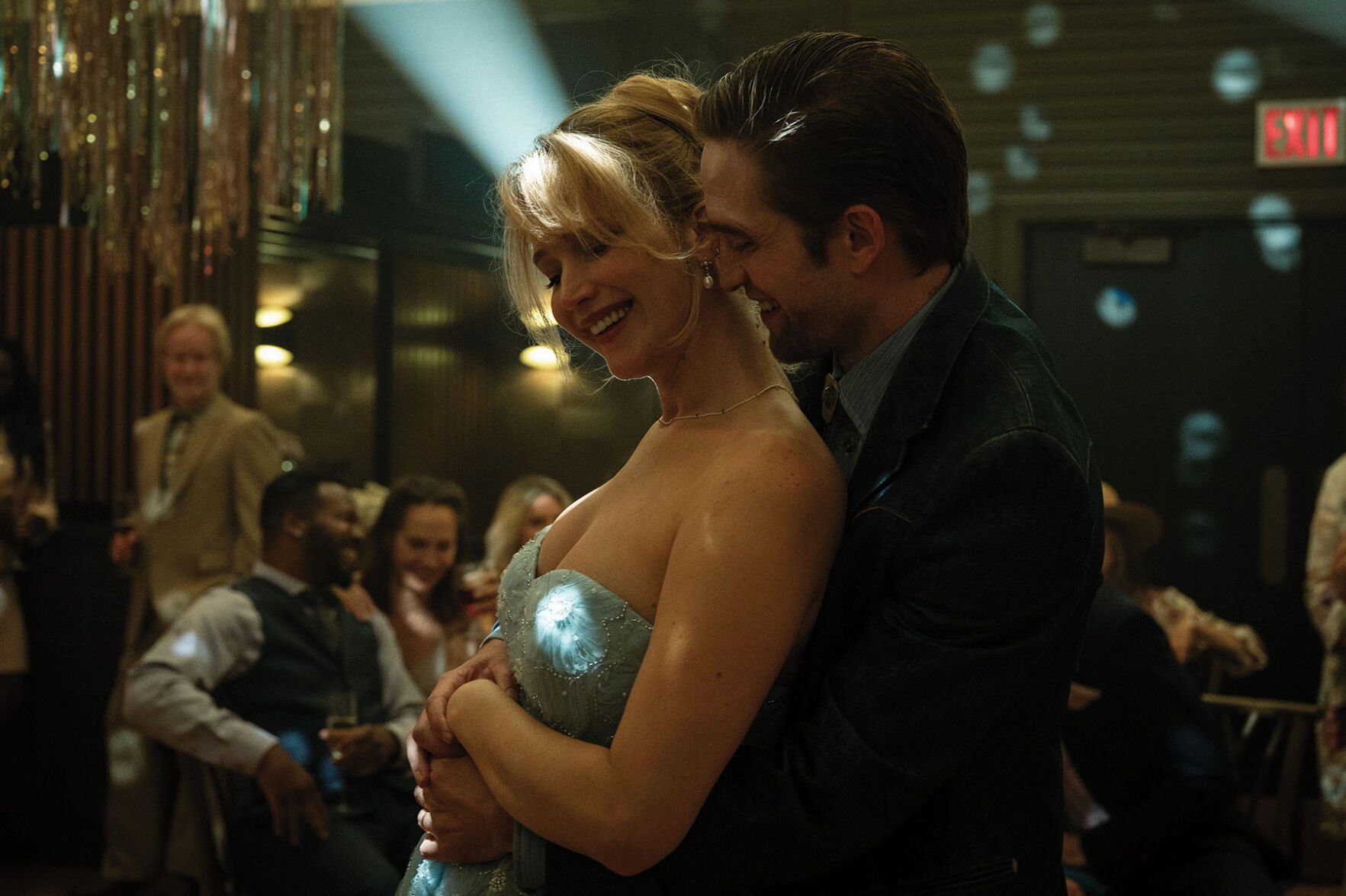When we first see the house of Die My Love, in a grand static shot determined to wring all the tension from foreground/background contrasts, the question seems to seep up through the wooden floorboards, like ants or secrets. The leaves that line the floors are not addressed directly, but they echo that same question — one that recurs throughout many different events throughout the film. “What exactly has happened here?”
It takes the young couple, Grace (Jennifer Lawrence) and Jackson (Robert Pattinson), some time to get at the tragic circumstances of the uncle, now-removed, who lived in the house they’re now moving into. They were in New York in some capacity, but a newborn and unspoken circumstances put them in this place, down the road from Jackson’s family home (where an intermittent reunion of 2001’s In the Bedroom recurs). This new arrangement will facilitate Jackson’s unelaborated-on job — one that requires him to travel often and passively chip away at Grace’s certainties. She was a writer, but not so much now. Not with the baby and this new house. And all this history.
You can sense landmark works of womanhood-in-crisis percolating in Die My Love’s insides. A Woman Under the Influence, Women on the Verge of a Nervous Breakdown, Diary of a Mad Housewife, Opening Night, Secret Ceremony — you can feel the foremothers of these kinds of narratives stalking the woods around Grace and Jackson’s new home. And though there’s nothing that speaks to any specific time period, what director/co-writer Lynne Ramsay (Morvern Callar, You Were Never Really Here) gets across is the unspoken weight of being alive and trying to be sociable and pleasant even as it pulls at your feet like the thickest of mud. Ramsay shoots in the Academy ratio, and it echoes its 1.37:1 sibling Bugonia in demonstrating “the frame” in both senses of the word: the space that demonstrates and differentiates the image it contains, and also a construction, mostly figurative, that implicates and entraps.
This is another of those fearless films, echoed with a go-for-broke performance from Lawrence that pulls no punches and doesn’t really care if you sympathize with her situation or responses to it. Though free with the body and its many means of expressing deeper emotions, Die My Love makes a couple of choices that have nothing to do with physicality and incarnation that you know would cause corporate board rooms and focus groups to throw up their hands in resigned dismay. You’ll know when it happens — a choice that walks the fine line between gutsy and foolish and shuts down some audience members completely and instantly.
But you don’t seek out the cinema of Lynne Ramsay looking for an easy ride. She has always had a gift for making the delineation between the internal and the external elusive, immersing the viewer in character studies that sidestep narration and exposition to let us live inside another life — and our subject Grace allows for empathy, shock, revulsion, pity and analysis. But she does not invite any of these things. Tickets get bought, and rides get taken. There are temporal shifts here, but nothing that needs to be solved like a math problem. These jumps in time serve more to unify the vibe. Even as the opening credits are unfolding, we’re immersed in a forest springing into fiery life. Is it a literal fire, or something more metaphorical or symbolic? The answer is yes.
There are scenes between Lawrence and Sissy Spacek (as Jackson’s mother) that build on a languid, palpable tension that feel like they could tear the roof off the world. I haven’t read the Ariana Harwicz novel that the film springs from, so I can’t comment on it as a work of adaptation. But Ramsay and co-writers Alice Birch and Enda Walsh are tapped into something electric. There’s a wedding sequence, scored to patron saint of Nashville John Prine and Iris DeMent’s “In Spite of Ourselves,” that feels like an echo of We Need to Talk About Kevin’s tomato festival, only with confetti and menace instead of Tilda Swinton’s cathartic crawl through nightshade pulp. Lakeith Stanfield haunts the periphery of the film, a mysterious motorcyclist who embodies several different potentialities (including becoming a future discourse lightning rod when this film opens wide). There’s an afternoon spent with Toni Basil’s “Mickey” that skips through a day in a manner both effervescent and bone-chilling. What is it about this house that calls forth these things from Grace? This ongoing series of genuinely shocking moments, in the service of something spectacular.
Just a word of friendly advice: If your significant other says what your family and home need is a cat, and you bring home a dog … well, that’s what we call a hint-and-a-half. But more than that, as a ride-or-die for 2017’s mother!, I find no insignificant amount of joy to report that Lawrence wreaks great vengeance against her sworn enemy, the sink.





